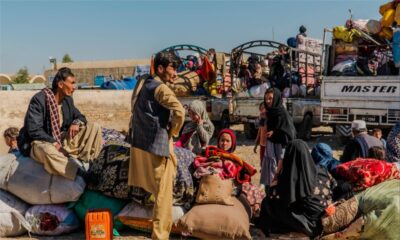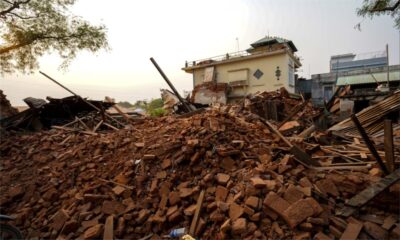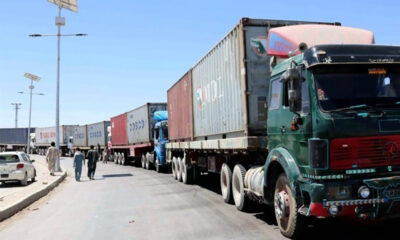Climate Change
COP29’s $300 billion deal ‘insufficient’ to fight climate change
After days of negotiations in Azerbaijan, rich countries agreed to raise their contribution from $250 billion to $300 billion a year by 2035

The finance agreement reached at the COP29 summit late Sunday night has sparked outrage around the world as countries criticize negotiators for failing to meet the scale of the challenge.
After days of negotiations in Azerbaijan, rich countries agreed to raise their contribution from $250 billion to $300 billion a year by 2035.
According to BBC, the African Group of Negotiators described it as “too little, too late”; the representative from India dismissed the money as “a paltry sum” and a group of NGOs warned that the $300 billion pledge does not go far enough to help those most vulnerable to climate change.
Poorer countries had asked for $1.3 trillion to help them fight the climate battle.
Meanwhile, China and India are still defined by the United Nations as “developing” countries and as a result they have no formal obligation to cut their greenhouse gas emissions or to provide financial help to poorer countries.
Both countries are technically eligible to receive climate aid, although China chooses not to do so. Beijing, one of the world’s largest economies, does step in to support countries with the impact of global warming, via bilateral agreements.
India, however, does accept support from “developed” nations.
Speaking to BBC, one source said there had been one positive during the summit. This was China.
“The only bright spot in all of this is China,” the source said.
According to him, not only was Beijing’s negotiating style markedly different to previous years, but “China could be stepping forward”.
In the past, China has released minimal information about its climate policies and plans, but this year, for the first time, officials said they have paid developing countries more than $24 billion for climate action since 2016.
“That’s serious money, almost nobody else is at that level,” another COP insider said.
Where does Afghanistan fit into this?
Afghanistan is considered one of the most vulnerable countries when it comes to climate change and for the first time in three years, the Islamic Emirate was able to participate at the summit.
Leading a delegation to COP29 was Matuil Haq Khalis, who’s head of the country’s environment protection agency. He said Afghanistan needs international support to deal with extreme weather like erratic rainfall, prolonged droughts and flash floods.
“All the countries must join hands and tackle the problem of climate change,” said Khalis.
Afghanistan has been hard hit by climate change, with a recent assessment by experts ranking it the sixth most climate vulnerable country in the world.
In March, northern Afghanistan experienced heavy rains resulting in flash floods, killing over 300 people. Climate scientists have found that extreme rainfall has gotten 25% heavier over the last 40 years in the country.
Khalis meanwhile said Afghanistan has prepared national action plans to deal with climate change and will be updating its climate goals within the next few months.
Contributing nations
There are 23 “developed” nations, which are industrialized countries with a strong economy, that have to contribute and reach the annual target of $300 billion.
However, many developed countries want to see this group expanded, arguing that the global landscape has shifted a lot since these classifications were drawn up as part of the original UN Framework Convention on Climate Change in 1992.
China, India and the Gulf states, for example, are still classed as developing nations despite their increasing contributions to global warming.
Outcry over deal reached
Sunday’s night’s finance deal has sparked heated reaction from developing nations but some global leaders, however, maintain that the agreement will keep climate action going.
US President Joe Biden said: “While there is still substantial work ahead of us to achieve our climate goals, today’s outcome puts us one significant step closer”.
EU Climate Commissioner Wopke Hoekstra, who attended the talks, said COP29 “will be remembered as the start of a new era on climate finance” and the deal was “an ambitious and realistic goal and an increased contributor base”.
UN Secretary General Antonio Guterres said: “I had hoped for a more ambitious outcome – on both finance and mitigation – to meet the scale of the great challenge we face, but the agreement reached provides a base on which to build.”
But for many others, the deal was not welcomed.
ActionAid UK described the agreement as “a complete catastrophe and farce” and warned the amount is “a drop in the ocean” compared with “the trillions needed to help climate-hit communities”.
Environmental group Friends of Earth said the talks have “failed to solve the question of climate finance”, adding that developing nations are being “hammered by climate extremes”
India’s representative meanwhile lashed out and said the $300 billion deal showed that intense frustration still remained over the agreement.
“We cannot accept it … the proposed goal will not solve anything for us. [It is] not conducive to climate action that is necessary to the survival of our country,” Chandni Raina told the conference, saying the amount was too small.
Raina said the decision-making process was unfair and excluded nations, a comment which was met with cheers and applause in the room.
Meanwhile, Nigeria’s envoy Nkiruka Maduekwe described the deal as an “insult”.
Climate Change
Tornadoes, heavy rains rip across central, southern US
Millions of people are under alerts for tornadoes and flash floods and dangers will continue into early Thursday
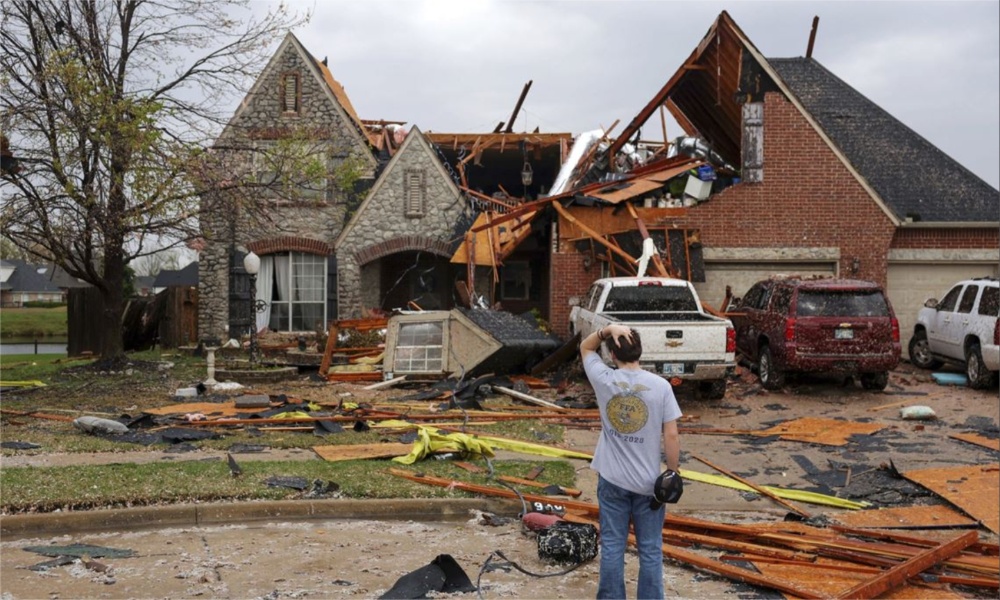
Tornadoes ripped across a wide swath of central and southern United States on Wednesday, destroying homes and businesses and bringing down power lines and trees.
The National Weather Service said there had been at least 15 reports of tornadoes in at least four states by late Wednesday.
Eight people have been injured across Kentucky and Arkansas, including one critically injured in Kentucky’s Ballard County, local officials said.
Late Wednesday, Arkansas Governor Sarah Huckabee Sanders declared a state of emergency across the state due to the storms, which also brought hail and torrential rain, Reuters reported.
The NWS said millions of people were under alerts for tornadoes and flash floods and that dangers would continue into early Thursday.
Violent storms are forecast to ravage the country for several days, the NWS said, with Wednesday just “the beginning of a multi-day catastrophic and potentially historic heavy rainfall event.”
“The word for tonight is ‘chaotic’,” said Scott Kleebauer, a NWS meteorologist. “This is a large expanse of storms migrating slowly to the east, stretching from southeast Michigan down into southeastern Arkansas.”
The town of Nevada, Missouri, was hit by a tornado. Writing on social media, the state’s Emergency Management Agency said it caused “major damage to several businesses, power poles were snapped and several (empty) train cars were flipped onto their sides by the powerful storm!”
The NWS issued tornado and flash flood warnings for parts of Missouri, Arkansas, Tennessee, Mississippi, Indiana, Illinois, Kentucky and Oklahoma.
It called the rain threats for Arkansas, Missouri, Tennessee and Mississippi in the coming days a “generational flood event” with some locations forecast to see as much as 15 inches (38.1 cm) of rain by the weekend, which could cause rivers to burst their banks and cause “catastrophic river flooding.”
More than 400,000 customers had their power knocked out across the storm-hit area, according to PowerOutage.us.
Climate Change
UN urges aid to Myanmar quake survivors before monsoons hit, death toll climbs towards 3,000
Aid groups in Myanmar warned that the window to find survivors was closing fast.
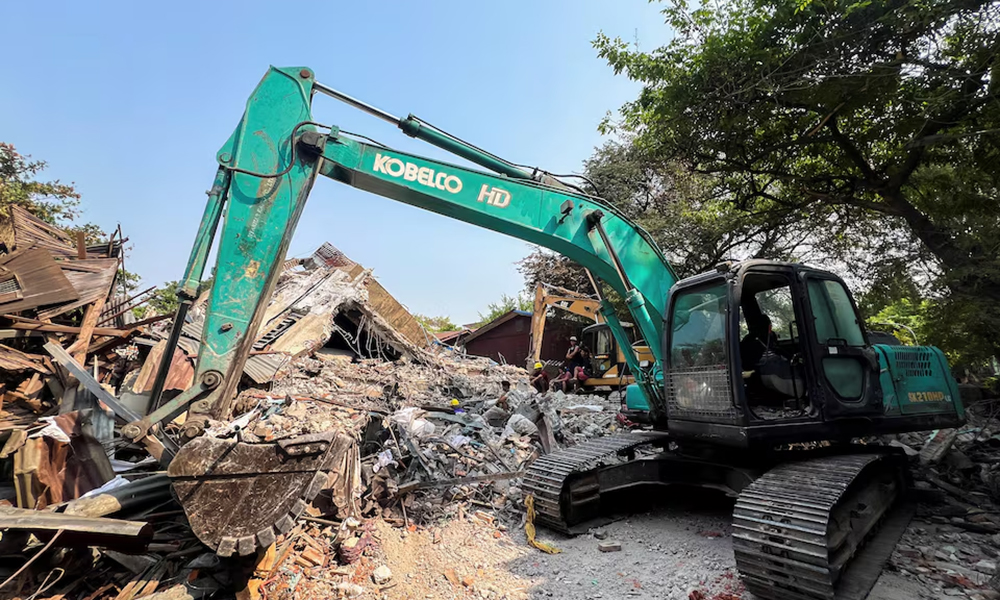
United Nations officials who surveyed earthquake damage in Myanmar urged the global community on Tuesday to ramp up aid before the looming monsoon season worsens already catastrophic conditions, with the death toll at 2,719 and expected to surpass 3,000.
Drinking water, hygiene, food, shelter and medicine are the most critical needs following extensive damage to buildings, roads and bridges, said Marcoluigi Corsi, acting humanitarian and resident coordinator following a two-day visit.
“We remain, of course, deeply committed to reaching people in Myanmar who need aid,” U.N. spokesperson Stephane Dujarric said. “And we must act swiftly to provide relief before the upcoming monsoon season, which, of course, will even worsen this horrendous crisis.”
A civil war in Myanmar had displaced more than 3 million people long before the quake struck. U.N. Special Envoy for Myanmar Julie Bishop urged all sides to immediately cease fire, permit humanitarian access and ensure aid workers are safe.
“Continuing military operations in disaster-affected areas risks further loss of life,” she said in the statement.
Aid groups in Myanmar warned that the window to find survivors was closing fast.
Myanmar’s military ruler Min Aung Hlaing said the death toll from Friday’s 7.7 magnitude quake reached 2,719 as of Tuesday morning and was expected to surpass 3,000. Some 4,521 people were injured and 441 missing.
“Among the missing, most are assumed to be dead. There is a narrow chance for them to remain alive,” he said in a speech.
The quake, which struck at lunchtime on Friday, was the strongest to hit the Southeast Asian country in more than a century. It toppled ancient pagodas and modern buildings alike and inflicted significant damage on Myanmar’s second city Mandalay and Naypyitaw, the capital the previous junta purpose-built to be an impregnable fortress.
U.N. agencies said hospitals were overwhelmed and rescue efforts hindered by infrastructure damage and the civil war. Rebels have accused the military of conducting airstrikes even after the quake and on Tuesday a major rebel alliance declared a unilateral ceasefire to help relief efforts.
The earthquake was the latest in a succession of blows for the impoverished country of 53 million people following a 2021 coup that returned the military to power and devastated the economy after a decade of development and tentative democracy.
Myanmar’s military has been accused of widespread atrocities against civilians as it fought to quell a multi-pronged rebellion after the coup. It has dismissed the accusations as misinformation and says it is protecting the country from terrorists.
In neighbouring Thailand, the death toll from the quake rose to 21 on Tuesday, with hundreds of buildings damaged. Rescuers kept searching for life in the rubble of a collapsed skyscraper under construction in the capital Bangkok, but acknowledged time was against them.
The region has been hit by five more aftershocks.
Julia Rees of the U.N. children’s agency UNICEF said she witnessed entire communities in Myanmar that had been flattened, with immense destruction and psychological trauma.
“And yet, this crisis is still unfolding. The tremors are continuing. Search and rescue operations are ongoing. Bodies are still being pulled from the rubble,” she said in a statement.
“Let me be clear: the needs are massive, and they are rising by the hour. The window for life-saving response is closing.”
In the Mandalay area, 50 children and two teachers were killed when their preschool collapsed, the U.N. humanitarian agency said.
In a rare survival story, a 63-year-old woman who was trapped for 91 hours was pulled from the rubble of a building in Naypyitaw on Tuesday in a joint rescue effort by the Myanmar fire department and teams from India, China and Russia.
Myanmar’s civil war has complicated efforts to reach those injured and made homeless, including tight controls over the internet and communication networks.
The Three Brotherhood Alliance of three major rebel groups at war with the junta on Tuesday declared a unilateral one-month ceasefire, to allow urgent humanitarian efforts to “be carried out as swiftly and effectively as possible”.
In its nightly news bulletin on Tuesday, state-controlled MRTV quoted Min Aung Hlaing as saying the military had halted its offensives but unspecified ethnic minority armies were planning to exploit the disaster.
“The military is aware they are gathering, training, and preparing to attack,” it said, quoting the general as saying at an event to raise funds for quake victims. “We consider it as attacking us and will respond accordingly.”
One rebel group, the Karen National Union, on Sunday said the junta had conducted airstrikes in the east of the country at a time when it should be prioritising quake relief efforts.
Amnesty International said it had received testimony corroborating reports of air strikes near areas where quake recovery efforts were focused.
“You cannot ask for aid with one hand and bomb with the other,” said Amnesty’s Myanmar researcher Joe Freeman.
It was unclear if Min Aung Hlaing would make a rare foreign trip this week to attend a regional summit in Bangkok as planned. Thailand’s on Tuesday said the general may attend by teleconference.
In Bangkok, rescuers were still seeking signs of life in the ruins of an unfinished skyscraper that collapsed, aware that four days after the quake, chances had dimmed of finding survivors.
Fourteen deaths have been confirmed at the site and seven elsewhere in the city. The government is investigating the collapse and initial tests showed some steel samples from the site were substandard.
There were an estimated 70 bodies under the rubble and experts said 12 had been located using scanners, but access was blocked by large debris.
“Maybe they can survive one week or two weeks, so we have to go on,” Bangkok Governor Chadchart Sittipunt said. “The experts still have hope.”
Climate Change
UN and ICRC warn of serious water shortage in Afghanistan
The International Committee of the Red Cross in Afghanistan reported that an estimated 33 million people in the country face severe water shortage
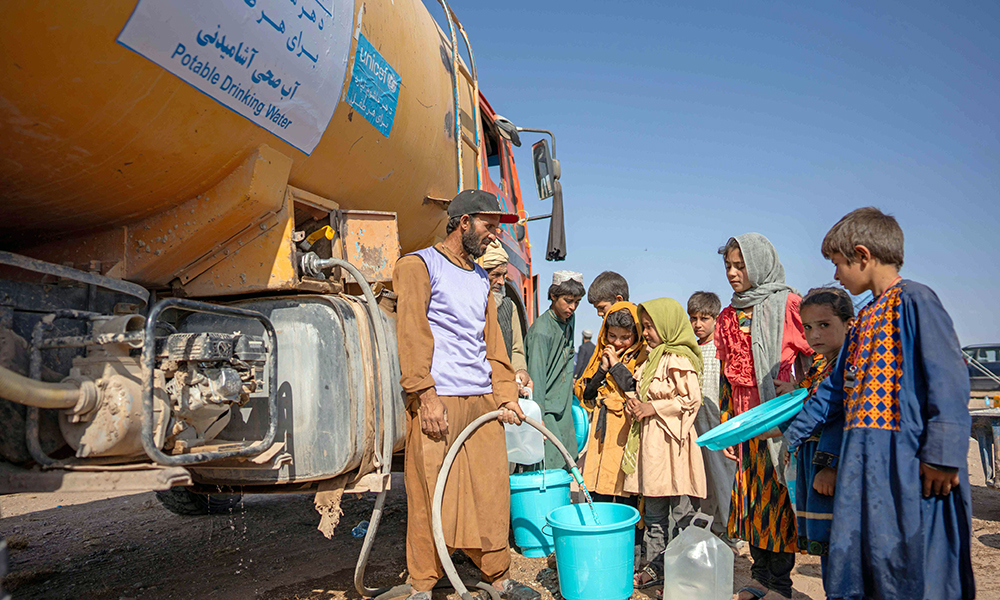
The United Nations Human Settlements Programme (UN Habitat) warned this week that 21 million people in Afghanistan are currently facing a serious water crisis and that the country needs major investments in water infrastructure.
Stephanie Loose, the head of the programme, said in a report that major Afghan cities such as Kabul, Kandahar and Herat are also facing a serious shortage of clean drinking water and that groundwater resources in these cities are decreasing significantly.
However, last week, the International Committee of the Red Cross (ICRC) in Afghanistan reported that an estimated 33 million people in the country face severe water shortage.
Marking World Water Day on March 22, the ICRC quoted a Kabul resident Shafiqullah Hamkar of District 5 in Kabul city as saying: “Our borewells have completely dried up because of the minimal snowfall and rainfall over the last few years.
“The sharp decline in groundwater levels has left us no choice but to rely on commercial water tankers for our most basic needs. It is a big challenge for us in the city,” he said.
ICRC said Hamkar represents an estimated 80% of Afghans who are dealing with the severe impact of erratic rainfall patterns, rising temperatures and droughts.
The situation is even worse in rural areas where people often rely on untreated surface water, which leads to the spread of waterborne diseases such as cholera and diarrhea.
“For millions of Afghans, who are already struggling with many challenges and facing a dire humanitarian situation, vital activities such as getting water to drink or cook and providing irrigation for crops are often impossible. This has a devastating impact on people’s health and access to food, and hampers the country’s potential for economic development,” says Martin De Boer, the head of programs for the International Committee of the Red Cross (ICRC) in Afghanistan.
He added that the lack of required infrastructure – including water-supply systems, dams and irrigation networks – further exacerbates the challenges. Responding to the needs of the people, the ICRC plays an important role in supporting communities and assisting authorities to improve and manage water supplies.
-

 Latest News5 days ago
Latest News5 days agoAfghanistan’s reconstruction is in the interest of EU: Uzbek president
-

 Latest News4 days ago
Latest News4 days agoMinistry of Economy calls on US to release Afghanistan’s frozen funds
-

 Latest News4 days ago
Latest News4 days agoPakistan ‘extends’ deadline for a week for Afghans to leave the country
-

 World4 days ago
World4 days agoAs Iran tensions build, US military moves warplanes to reinforce Middle East
-

 Sport4 days ago
Sport4 days agoIPL 2025: Batters in race for prestigious Orange Cap
-

 World5 days ago
World5 days agoIsrael kills Hezbollah official in deadly Beirut airstrike
-
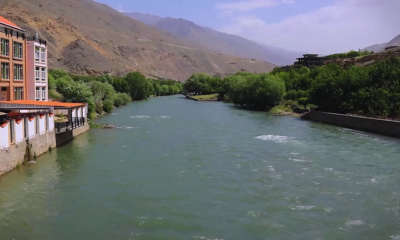
 Latest News4 days ago
Latest News4 days agoPanjshir to Kabul water conduit project ‘waiting for budget approval’
-
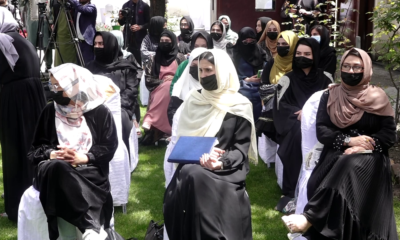
 Latest News4 days ago
Latest News4 days agoFemale journalists complain about lack of access to accurate and timely information








